

Best Directors Salary and Dividend Levels 2016/17 - JF Financial : Accountants. Question: “I am a contractor freelancer operating through a limited company and I use the low salary and dividend combination of extracting money from my company.
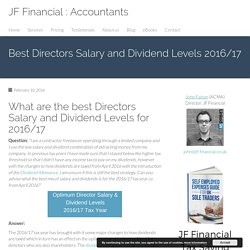
In previous tax years I have made sure that I stayed below the higher tax threshold so that I didn’t have any income tax to pay on my dividends, however with the changes to how dividends are taxed from April 2016 with the introduction of the Dividend Allowance, I am unsure if this is still the best strategy. Can you advise what the best mix of salary and dividends is for the 2016/17 tax year i.e. from April 2016?”
Answer: The 2016/17 tax year has brought with it some major changes to how dividends are taxed which in turn has an effect on the optimum tax planning positions for directors who are also shareholders. The dividend changes from April 2016 have been covered by us in a previous article but we will outline the position again in this article. How dividend taxation worked before the 16/17 tax year. Sole Trader vs Limited Company 2016/17. What are the key advantages and disadvantages of trading as a self employed sole trader vs limited company for the 2016/17 tax year?
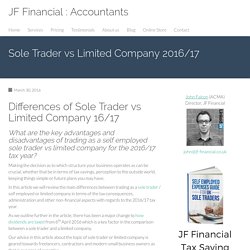
Making the decision as to which structure your business operates as can be crucial, whether that be in terms of tax savings, perception to the outside world, keeping things simple or future plans you may have. In this article we will review the main differences between trading as a sole trader / self employed or limited company in terms of the tax consequences, administration and other non-financial aspects with regards to the 2016/17 tax year. As we outline further in the article, there has been a major change to how dividends are taxed from 6th April 2016 which is a key factor in the comparison between a sole trader and a limited company.
Our advice in this article about the topic of sole trader or limited company is geared towards freelancers, contractors and modern small business owners as that is our area of expertise. Dividends - what are they, and how are they taxed? Income Tax rates and Personal Allowances. How much Income Tax you pay in each tax year depends on: how much of your income is above your Personal Allowance how much of this falls within each tax band Some income is tax-free.
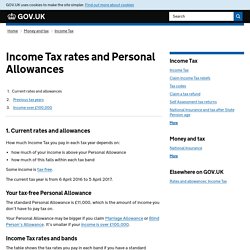
The current tax year is from 6 April 2016 to 5 April 2017. Your tax-free Personal Allowance The standard Personal Allowance is £11,000, which is the amount of income you don’t have to pay tax on. Your Personal Allowance may be bigger if you claim Marriage Allowance or Blind Person’s Allowance. Sole trader or limited company: which is best for you? As the end of the tax year approaches, it’s a good time to think about how your business is structured, and whether you want to make a switch.
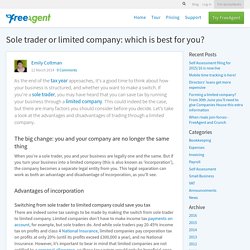
Limited company or sole trader – which is best for me? – ByteStart. One of the first tasks you will have when starting up your business will be to decide whether to set up a new limited company, or become self-employed.
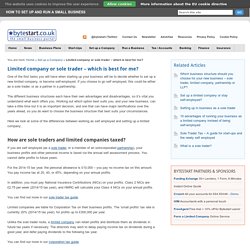
If you choose to go self employed, this could be either as a sole trader, or as a partner in a partnership. The different business structures each have their own advantages and disadvantages, so it’s vital you understand what each offers you. Working out which option best suits you, and your new business, can take a little time but it is an important decision, and one that can have major ramifications over the years ahead, so you do want to choose the business structure that best suits your circumstances. Here we look at some of the differences between working as self employed and setting up a limited company;
Rapidformations.co. In order to register a private company limited, you must issue at least one share.
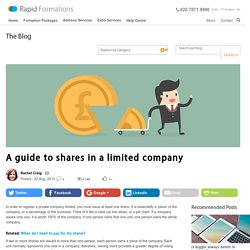
It is essentially a ‘piece’ of the company, or a percentage of the business. Think of it like a cake cut into slices, or a pie chart. If a company issues only one, it is worth 100% of the company. If one person owns that one unit, one person owns the whole company. Related: When do I need to pay for my shares? If two or more shares are issued to more than one person, each person owns a piece of the company. Company Formation - Online Company Formation & Registration by Company Formation MadeSimple. Accounting Software & Online Bookkeeping. Online Accounting. Sole trader or limited company: which is best for you? As the end of the tax year approaches, it’s a good time to think about how your business is structured, and whether you want to make a switch.
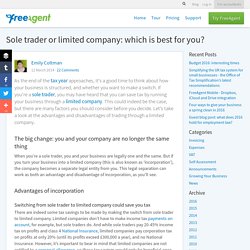
If you’re a sole trader, you may have heard that you can save tax by running your business through a limited company. This could indeed be the case, but there are many factors you should consider before you decide. Let’s take a look at the advantages and disadvantages of trading through a limited company. The big change: you and your company are no longer the same thing When you’re a sole trader, you and your business are legally one and the same.
Advantages of incorporation.